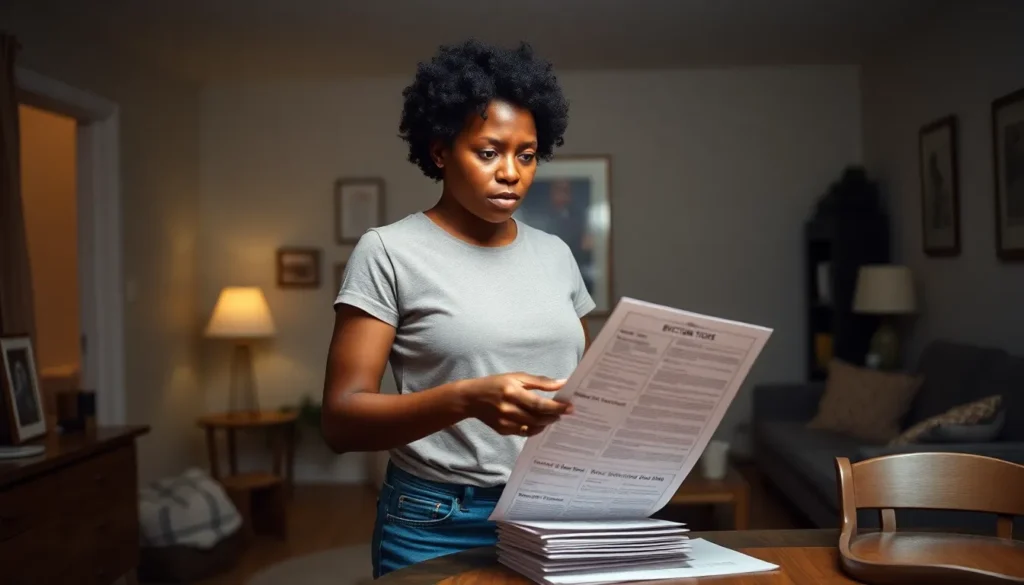In a world where unexpected surprises lurk around every corner—like that time the cat decided to use the new couch as a scratching post—renter eviction protection is the unsung hero every tenant needs. Imagine being able to stay in your cozy abode while your landlord navigates the complexities of life, all without the constant fear of eviction looming over your head. Sounds like a dream, right?
Renter eviction protection isn’t just a safety net; it’s a shield against the unpredictability of rental life. With the right knowledge and tools, tenants can confidently stand their ground, ensuring their home sweet home remains just that. So grab your favorite snack and settle in, because understanding how to protect oneself from eviction can make all the difference in turning a rental into a true sanctuary.
Table of Contents
ToggleOverview of Renter Eviction Protection
Renter eviction protection acts as a vital safeguard for tenants navigating rental agreements. This protection ensures housing stability and alleviates the anxiety associated with eviction threats.
Definition of Renter Eviction Protection
Renter eviction protection encompasses laws and policies that prevent landlords from evicting tenants without just cause. Various jurisdictions implement these protections, providing a formal process that landlords must follow before evicting tenants. Laws may vary, but provisions often include notice requirements, the right to dispute eviction claims, and protections against retaliatory evictions. Understanding these definitions is crucial for both tenants and landlords to promote fair rental practices.
Importance of Renter Eviction Protection
Renter eviction protection plays a significant role in maintaining housing security. Ensuring eviction protection allows tenants to remain in their homes during financial hardships, promoting community stability. Access to these protections builds tenant confidence in their living situations and fosters a sense of safety. Additionally, these policies contribute to reduced homelessness and lower turnover rates, benefiting the housing market overall. Communities thrive when residents feel secure in their homes, emphasizing the critical nature of eviction protections.
Current Legal Landscape

Renter eviction protection laws significantly impact tenant rights across various jurisdictions. Understanding the legal landscape helps tenants navigate their situations effectively.
State-Specific Laws
State laws dictate specific eviction procedures and tenant protections. Many states require landlords to provide a notice period ranging from three to 60 days before initiating eviction. Some states also offer tenants the right to challenge eviction claims in court, fostering fair treatment. Laws vary widely; for instance, California mandates strict just-cause requirements for evictions. In contrast, other states might allow landlords broader discretion for evictions. Local ordinances can further enhance protections, reflecting community values and priorities.
Federal Regulations
Federal regulations play a crucial role in shaping eviction protections. The Fair Housing Act prohibits discrimination in housing and affirms tenants’ rights to fair treatment. Regulations under the COVID-19 pandemic established temporary eviction moratoriums, allowing tenants to remain in their homes during economic challenges. While these protections provided immediate relief, they also highlighted the need for lasting measures. The Department of Housing and Urban Development continues to explore policies addressing housing stability. Understanding these regulations equips tenants with knowledge, enabling them to advocate for their rights effectively.
Common Reasons for Eviction
Evictions often occur due to various issues that can impact a tenant’s ability to maintain a lease agreement. Understanding these common reasons can help tenants navigate their rights and responsibilities.
Non-Payment of Rent
Non-payment of rent remains the most prevalent cause for eviction. Landlords typically initiate the process when tenants fail to pay rent on time. Each jurisdiction mandates specific notice periods before eviction can begin. Some states require a grace period, while others allow immediate action. Tenants facing financial difficulties may consider communicating with landlords to negotiate payment plans. Documenting these discussions can also be beneficial.
Lease Violations
Lease violations cover a broad range of infractions that can lead to eviction. Common issues include unauthorized subletting, excessive noise, or damage to property. Landlords often issue written warnings prior to beginning eviction proceedings. Many leases contain clauses outlining the consequences of such violations. Tenants may challenge these claims if they believe the violations lack merit. Knowledge of lease terms empowers tenants to address issues promptly and effectively.
Other Factors
Other factors leading to eviction include criminal activity and nuisance complaints. Engaging in illegal activities on the property can prompt immediate landlord action. Similarly, consistent disturbances or harassment complaints can destabilize the community environment. Tenants facing such claims have the right to contest them in court. Seeking legal advice often proves advantageous in these situations. Understanding the implications of such claims can help tenants protect their housing stability.
Renter Rights and Protections
Renter rights and protections play a crucial role in nurturing secure living conditions for tenants. Understanding these rights empowers individuals to act when facing eviction.
Tenant Notification Requirements
Tenant notification requirements vary significantly by location. Many jurisdictions mandate landlords to provide written notice before any eviction proceeding. Notices typically range from 3 to 30 days depending on the reason for eviction, such as non-payment or lease violations. During this notification period, tenants generally have the right to address the issue, which could involve paying overdue rent or remedying lease breaches. By staying informed about these requirements, tenants can better safeguard their housing rights and respond effectively to eviction notices.
Legal Aid Resources
Various legal aid resources exist to assist tenants facing eviction. Nonprofit organizations and legal clinics provide free or low-cost legal services to help individuals understand their rights. Many cities designate specific agencies focused on housing issues, offering programs that guide tenants through eviction processes. Courts often maintain self-help centers that further clarify legal procedures and available remedies. Connecting with these resources can significantly enhance a tenant’s ability to navigate complex eviction situations and advocate for fair treatment.
Impact of Renter Eviction Protection
Renter eviction protection significantly affects tenants by enhancing their security. This stability fosters a sense of belonging, crucial for emotional well-being. Tenants facing financial hardship experience relief, knowing they can negotiate with landlords without immediate fear of eviction. Protections ensure that tenants can address issues proactively, such as repayment plans or lease compliance. During critical times, like the COVID-19 pandemic, these protections provided crucial lifelines, helping reduce stress and anxiety around housing stability.
Effects on Tenants
Tenants benefit from eviction protections in various ways. Emotions and stress levels decrease when individuals know they cannot be evicted without just cause. Housing security often leads to improved mental health and greater community participation. Trust in the rental market increases when tenants feel protected from unfair evictions. Access to legal resources and advocacy enhances tenants’ ability to fight unjust actions from landlords. Ultimately, these protections create an environment where tenants can thrive and contribute positively to their communities.
Economic Implications
Economic implications of renter eviction protection extend beyond individual situations. These protections reduce homelessness, which can strain local resources and support systems. Communities experience less turnover in housing, stabilizing local housing markets. A stable tenant population often leads to increased consumer spending within neighborhoods. Local economies thrive when tenants feel secure in their homes, as they are more likely to invest in their living situations. Long-term financial health improves both for tenants and cities when housing security is prioritized.
Renter eviction protection is essential for fostering a secure and stable living environment. By understanding and utilizing these protections, tenants can navigate the complexities of rental agreements with confidence. The ability to address issues without the looming threat of eviction empowers individuals to maintain their homes and contribute positively to their communities.
As housing stability remains a critical concern, these protections not only benefit tenants but also enhance the overall health of local economies. Advocating for and being aware of renter rights can lead to a more equitable housing landscape, ensuring that everyone has a place to call home.




